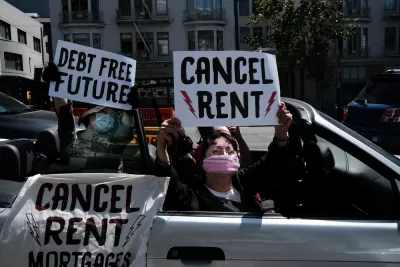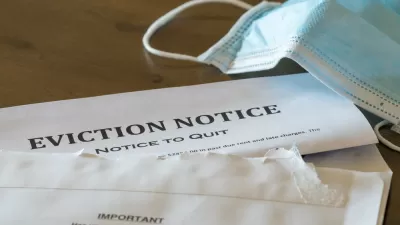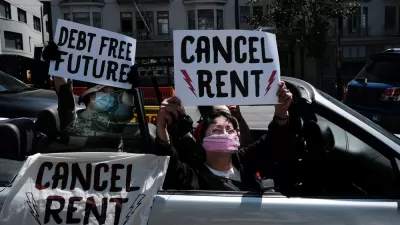The share of U.S. households facing rent debt is decreasing as the economy begins to recover from the pandemic, but rent debt is still concentrated by geography and demographics around the country.

A report by the National Equity Atlas and the Right to the City Alliance, "shows that 14% of all renting households are behind on payments, with the average amount owed being $3,400," reports Elliott Davis. The most recent data are for March, taken from from the U.S. Census Bureau's Household Pulse Survey and five-year 2019 American Community Survey, as well as the University of Southern California's Center for Economic and Social Research.
According to the data, Alabama, Louisiana, and Florida are the states with the highest proportion of households carrying rent debt. Hawaii has the highest rent debt per household. The report lacks data for Mississippi, North Dakota, South Dakota, West Virginia, and Wyoming due to insufficient data. The report also includes data for metropolitan areas.
Davis also notes the "extreme racial and socioeconomic disparities when it comes to who is behind on rent during the coronavirus pandemic." According to the report, "People of color make up 63% of the households that are in rent debt, and 78% are low-income households making less than $50,000, the data indicates."
As mentioned in articles covering the rent debt and eviction crisis in the early days of the pandemic, much of the economic stress of the pandemic has been absorbed by renters already struggling to pay the rent before the pandemic. "The National Equity Atlas' data shows that 46% of Black households, 45% of Latinx households and 42% of Native American households were "rent burdened and economically insecure" in 2019," explains Davis.
FULL STORY: Data Shows 5.7 Million U.S. Households Are Behind on Rent

Alabama: Trump Terminates Settlements for Black Communities Harmed By Raw Sewage
Trump deemed the landmark civil rights agreement “illegal DEI and environmental justice policy.”

Study: Maui’s Plan to Convert Vacation Rentals to Long-Term Housing Could Cause Nearly $1 Billion Economic Loss
The plan would reduce visitor accommodation by 25% resulting in 1,900 jobs lost.

Planetizen Federal Action Tracker
A weekly monitor of how Trump’s orders and actions are impacting planners and planning in America.

Wind Energy on the Rise Despite Federal Policy Reversal
The Trump administration is revoking federal support for renewable energy, but demand for new projects continues unabated.

Passengers Flock to Caltrain After Electrification
The new electric trains are running faster and more reliably, leading to strong ridership growth on the Bay Area rail system.

Texas Churches Rally Behind ‘Yes in God’s Back Yard’ Legislation
Religious leaders want the state to reduce zoning regulations to streamline leasing church-owned land to housing developers.
Urban Design for Planners 1: Software Tools
This six-course series explores essential urban design concepts using open source software and equips planners with the tools they need to participate fully in the urban design process.
Planning for Universal Design
Learn the tools for implementing Universal Design in planning regulations.
Caltrans
Smith Gee Studio
Institute for Housing and Urban Development Studies (IHS)
City of Grandview
Harvard GSD Executive Education
Toledo-Lucas County Plan Commissions
Salt Lake City
NYU Wagner Graduate School of Public Service





























